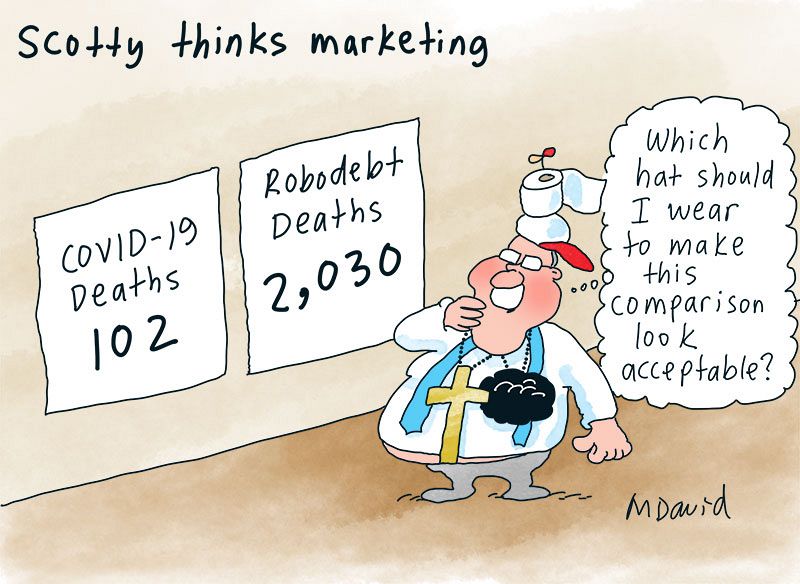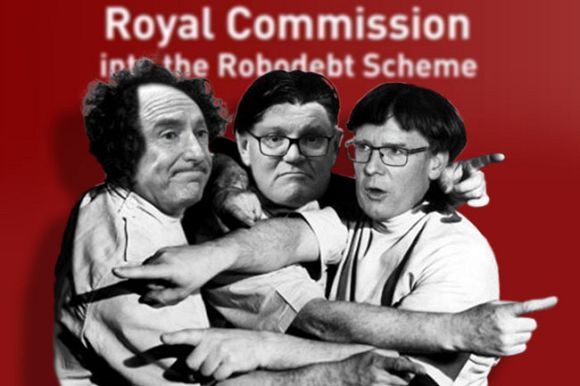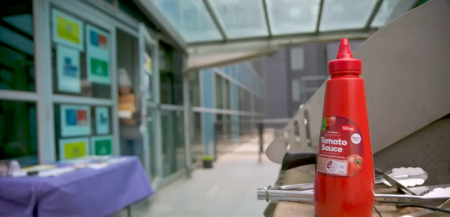Scott Morrison and Stuart Robert presided over a gross policy failure that brutally harmed vulnerable Australians and cost the nation $1.2 billion in compensation. Yet they still have their jobs, writes Belinda Jones.
HEARING BLOCK 4 of the Royal Commission into the Robodebt Scheme is drawing to a close: witnesses will soon be excused and lawyers will return to their chambers.
Commissioner Holmes will then be tasked with the mammoth responsibility of collating all the evidence since the Letters Patent were issued and delivering a report by 30 June 2023 — sure to be a blockbuster when it hits the shelves!
So, what have we learned thus far from the Robodebt Royal Commission (RC)? That many highly paid public service executives are useless and lots of politicians are liars? We knew that. And the finest of examples in their respective fields have now appeared before the Robodebt RC.
The RC also illustrated how the media manipulates the narrative by omission: either not reporting on matters or reporting very little on matters of public importance. Despite the shocking revelations from all four hearing blocks, the story rarely led the news, let alone dominated it — as it should have.
Australians should be absolutely reeling from the revelations of the Robodebt RC, but many are oblivious to them because they rely mostly on mainstream media for their information. The RC has had to compete with a crowded narrative over the last several months.(Although mainstream media chose minimal reporting on the Royal Commission, independent mastheads provided excellent ongoing, front-page coverage.)
Compare mainstream media’s saturation coverage of the Albanese Government’s proposed changes to superannuation to coverage of the Robodebt RC. Chalk and cheese.
When mainstream media considers that ending a tax break for the mega-wealthy is more newsworthy than the monumental failure of Coalition policy and the intentional cruelty Robodebt inflicted on 400,000 vulnerable Australians, it’s a reflection of their journalistic integrity and judgement. And, by default, our own society.
More often than not, Australians’ apathy to politics is born out of ignorance of matters under-reported by mainstream media and the simultaneous sensationalisation of alternate matters designed to distract. This is a deliberate, pre-meditated betrayal of journalistic principles and the Australian people by the conservative, mainstream Fourth Estate. And this imperils our democracy as a nation at fundamental level.
Social media has been the panacea to this problem: there are no mainstream editors on social media to stop the RC trending daily, which it has done so during every hearing block.
The other main takeaway from the RC, at this stage, is the depths of depravity and incompetence to which the Liberal Party sunk.
Former Prime Minister Scott Morrison and his Robodebt-responsible ministers – Stuart Robert, Alan Tudge, Christian Porter and Marise Payne – over time, targeted 400,000 of the most vulnerable people in society with poorly planned policy costing $1.2 billion in compensation after the 2020 court settlement. The sheer lack of the Morrison Government’s professionalism for not ensuring the policy was legal, in the first instance, was the beginning of the disaster.
Morrison and his ministers’ bull-headed obstinance to listen to reason or complaints about Robodebt – instead deciding to "double down" – only served to exacerbate the problem: a trait the former PM exhibited early in his career at Tourism Australia.
Evidence tendered at the RC indicated Morrison was told early in 2015 that the scheme was legally unsound.
As IA contributor Paul Begley explained in a recent story:
The policy might have come to nothing had legislation been required, but Royal Commission witnesses were hard-pressed to explain how a DSS minute in late February 2015 stating that legal advice was required before the policy could go to Cabinet had mysteriously changed by early March to a minute which omitted mention of that obstacle. Accordingly, Morrison was free to take the matter to Cabinet on the strength of the March minute.
Both as Treasurer and as Prime Minister, Scott Morrison wanted the money from Robodebt to help balance the Budget — "back In black" was central to his constant rhetoric and marketing prior to COVID. He was hellbent on achieving that milestone, though he was not prepared to risk political backlash from his affluent base to achieve it, so, with Stuart Robert’s help, he targeted the most vulnerable in society.
Morrison and Robert designed and implemented the Robodebt policy to hit society's vulnerable by targeting "specific geographic areas” to recoup illegal debts. That in itself should end their political careers.
The Coalition could have chosen any item on the Tax Expenditures and Insights Statement to help balance the Budget, like the costliest: capital gains tax or negative gearing. Morrison knew choosing either of those would cost him votes, so he chose to save his own political skin and target vulnerable people instead.
It certainly appears he knew the scheme required legislative change — he did not inform Cabinet of this fact. Ultimately, Morrison’s choice only increased pressure on the Budget rather than alleviating it, proving false economy.
Liberals and Coalition leaders and partners continue to support Morrison and Robert. This fundamental fact illustrates that the current stewards of conservative politics in Australia have a very low bar for integrity and competence. This toxic culture is the core reason for their current political disunity and potential demise.
Rather than acting with integrity, the Coalition fails to demand the resignations of Scott Morrison and Stuart Robert, flaccidly defending them and wearing the political fallout despite the consequences for their respective parties.
As Coalition leaders, Peter Dutton and David Littleproud lack the political nous and intestinal fortitude to demand Morrison and Robert’s resignations. Two of their Coalition MPs were responsible for a monumental policy failure — they lied to Cabinet and the public about the success of the Robodebt scheme. They cost the nation $1.2 billion in compensation and were the impetus for this Royal Commission, yet they still have their jobs. They still collect their salaries. They still represent the Liberal Party and Coalition.
There doesn’t seem to be any ambition by the Liberals to recognise and remedy the fundamental integrity and competency issues at the heart of their electoral defeat in May 2022.
Like mainstream media, they must think if they ignore it, it will go away.
It won’t.
For the Liberals to overcome this dark chapter in their history, they have to act purposefully and meaningfully to remedy the Robodebt devastation. To date, they’ve done nothing.
Dutton is like a roo in a spotlight as he struggles with press conferences and Question Time, uttering mindless talking points about Voice “detail” or pledging to fight for the mega-wealthy and repeal a superannuation tax hike not due to start until after the next election.
Meanwhile, Morrison sulks from the nose-bleed seats of Parliament while Robert’s presence on the front bench serves only to prove to Australia the abject failure of Dutton’s "leadership".
You can follow Belinda Jones on Twitter @belindajones68.
Related Articles
- EDITORIAL: Morrison, Robert, Tudge & Co should be in the foetal position over Robodebt
- Morrison, Robert, Tudge & Co should be in the foetal position over Robodebt
- Former Minister for In-Human Services Alan Tudge faces Robodebt RC
 This work is licensed under a Creative Commons Attribution-NonCommercial-NoDerivs 3.0 Australia License
This work is licensed under a Creative Commons Attribution-NonCommercial-NoDerivs 3.0 Australia License
Support independent journalism Subscribe to IA.















